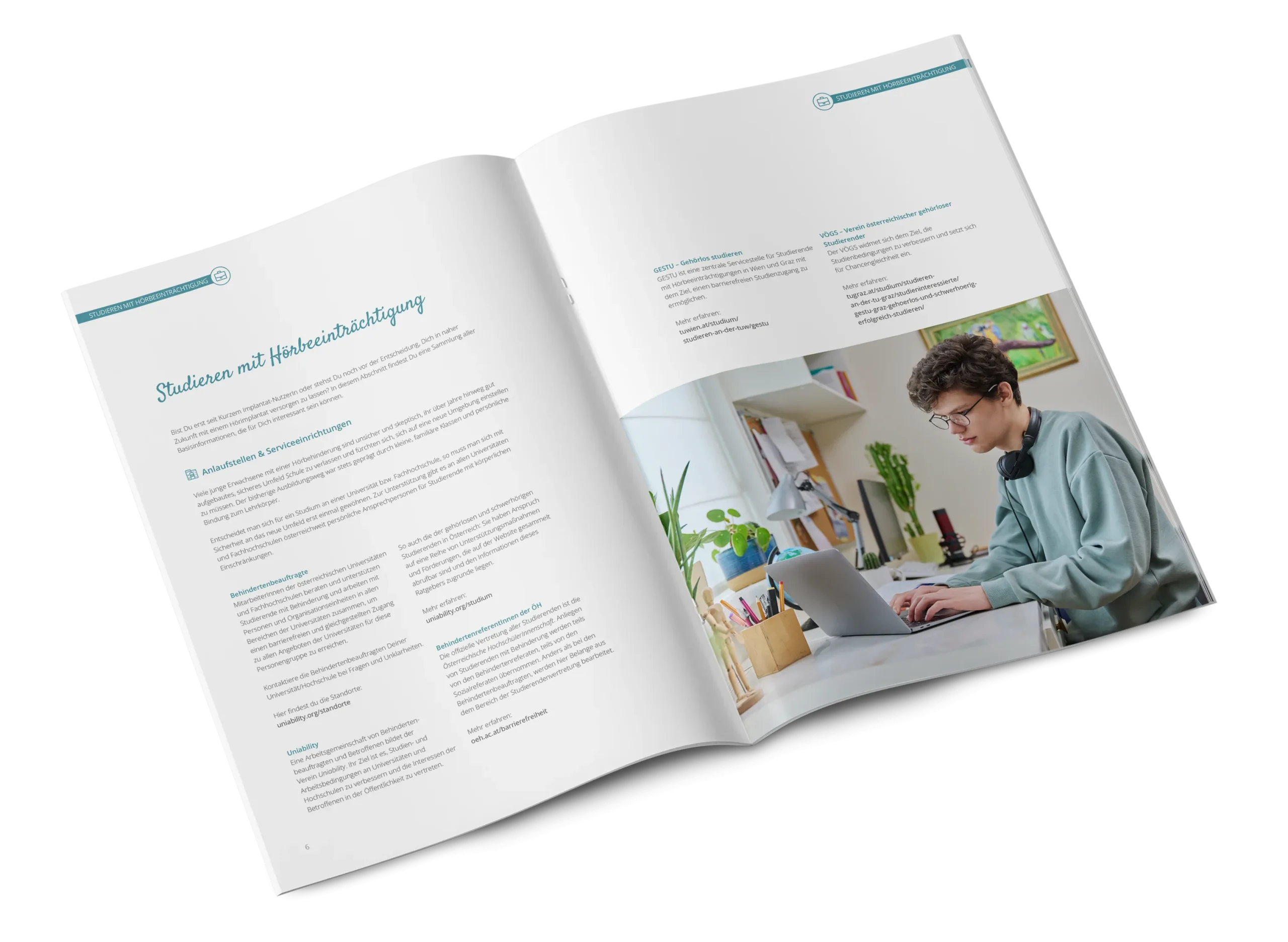Claims & tips


Claims & tips
Valuable tips on claims & more
If you have a hearing impairment, you can take advantage of a wide range of support from various institutions in Austria. Here you can find a list of your rights, funding entitlements, grants and other tips that can be helpful in everyday life.
Table of contents
Financial support
Below you will find direct links to the relevant offices. This data is regularly checked to ensure that it is up to date. Should you nevertheless come across incorrect information or if you are missing important information, we would be pleased to hear from you so that this page can be updated immediately.
Determination of the degree of disability
In order to be able to assert any claims, the degree of your disability must be determined. This is measured according to the type and severity of the functional impairment by the so-called EVO assessment regulation.
You can find more information at https://sozialministeriumservice.at/
Increased family allowance
![]() The increased family allowance is paid in addition to the family allowance and is payable for as long as the general family allowance is granted. The prerequisite for receiving the increased family allowance is a 50% degree of disability or the possible fact that you are permanently unable to support yourself.
The increased family allowance is paid in addition to the family allowance and is payable for as long as the general family allowance is granted. The prerequisite for receiving the increased family allowance is a 50% degree of disability or the possible fact that you are permanently unable to support yourself.
As soon as you are over 18 years old, you are entitled to family allowance if you are undergoing training or further training for a profession (apprenticeship, school, university, university of applied sciences, etc.). If you are a student with a degree of disability of at least 50 percent, you can receive the family allowance and the increased family allowance up to the age of 25.
The increased family allowance is also relevant for the possible receipt of care allowance.
The office responsible for applying for the increased family allowance is the local tax office.
Care allowance
![]() Care allowance can be received if the following conditions are met:
Care allowance can be received if the following conditions are met:
- Permanent need for care and assistance due to a physical, mental or psychological disability or sensory impairment that is expected to last at least six months
- Permanent need for care of at least more than 65 hours per month
- Habitual residence in Austria, whereby care allowance can also be granted in the EEA area and in Switzerland under certain conditions
The amount of the care allowance is determined in seven stages, depending on the extent of the care required and regardless of the cause of the need for care.
Find out more about the care allowance
You can apply for care allowance from your social insurance provider:
- Pension insurance institution
- Insurance Institution for Public Employees, Railways and Mines (BVA)
- Social insurance for the self-employed (SVS)
Further information can be found in the brochure: "Information on care allowance - explained in plain language"
Disability pass
![]() The disability pass is an official photo ID and serves as standardized proof of a disability (regardless of the type of disability). Persons with a degree of disability or a reduction in earning capacity of at least 50 percent who are resident or ordinarily resident in Austria are entitled to a disability pass.
The disability pass is an official photo ID and serves as standardized proof of a disability (regardless of the type of disability). Persons with a degree of disability or a reduction in earning capacity of at least 50 percent who are resident or ordinarily resident in Austria are entitled to a disability pass.
You submit the application to the Social Ministry Service. Having a disability pass does not entitle you to any financial benefits. However, presenting the document (sometimes also in other EU countries) entitles you to discounts, for example on admission to various cultural and leisure facilities, events, sights, excursion destinations, ski resorts, etc.
Compulsory military service
In Austria, compulsory military service applies to male citizens who are called up from their 18th birthday, depending on their school and training situation.
They receive a summons to a physical examination, which they must always comply with. The purpose of the physical examination is to identify the mental and physical strengths and weaknesses of conscripts. It is intended to determine whether conscripts are able to perform their military service in a function appropriate to their abilities.
Men with a certain degree of hearing loss are usually classified as unfit and therefore do not have to perform basic military service.
After receiving an invitation to an examination, those affected have the option of a so-called "position in absentia". In addition to other relevant documents, specialist medical reports describing the degree of hearing loss in a meaningful way should be sent to the military commission. The addressee will find information on this in a separate paragraph of the invitation to apply.
Alternatively, the young man concerned can of course still attend the appointment and hand in the findings on arrival, which usually results in a short procedure for the appointment and saves him having to undergo further tests on site.
You can find detailed information on the obligation to post here: https://karriere.bundesheer.at/grundwehrdienst/stellung
Studying with a hearing impairment
![]() For many young adults with a hearing impairment, the question often arises of what to do after school. Do I do an apprenticeship? Do I start my career straight after leaving school? Or do I decide to continue my education and start studying at a university or university of applied sciences?
For many young adults with a hearing impairment, the question often arises of what to do after school. Do I do an apprenticeship? Do I start my career straight after leaving school? Or do I decide to continue my education and start studying at a university or university of applied sciences?
Many young adults with a hearing impairment are unsure and skeptical about leaving the safe environment they have built up over the years - school - and are afraid of having to adjust to a new environment. The previous educational path was always characterized by small, familiar classes and personal relationships with the teaching staff. If you decide to study at a university or university of applied sciences, you will certainly have to get used to the new environment. There are personal contact persons for students with physical disabilities at all universities/universities of applied sciences throughout Austria.
You can find a collection of all important information on the subject of "Studying with a hearing impairment" here:
Study grant
As a general rule, if the parents or the students themselves are unable to cover the costs associated with studying from their own resources due to the respective income limit, the study grant comes into play. The study grant is increased for students with hearing impairments and their entitlement is also extended by half of the planned duration of study for students who are deaf or severely hard of hearing or have a cochlear implant.
Detailed information can be obtained from the respective scholarship offices of the federal states.
- https://www.uniability.org/de/studium/finanzielle-foerderungen/studienbeihilfe/
- https://www.studieren.at/studieren-mit-behinderung/
- https://www.stipendium.at/studienfoerderung/studienbeihilfe/behinderung/
Disability representatives
Employees of Austrian universities and universities of applied sciences advise and support students with disabilities and work together with persons and organizational units in all areas of the universities in order to achieve barrier-free and equal access to all university services for this group of people. Contact the Disability Officer at your university/college if you have any questions or concerns.
Learn more
Uniability
Deaf and hard of hearing students are entitled to a range of support measures such as sign language and written interpreters, live subtitles, course recordings and support from tutors.
Lecture halls at many Austrian colleges and universities are equipped with induction loops or FM systems. Ask the disability officer at your university whether there are FM devices available to borrow or which lecture halls are equipped with induction loops.
Find out more
GESTU - Deaf Studies
GESTU is a central service point for students with hearing impairments in Vienna with the aim of providing barrier-free access to studies.
Learn more
VÖGS - Association of Austrian Deaf Students
The VÖGS is dedicated to improving study conditions and is committed to equal opportunities.
Learn more

Guide for students with hearing impairments: "Studying and learning with hearing implants"
In this brochure, you will find information on how young adults with hearing implants can make the most of their time at university. Whether learning in everyday life or in the lecture hall, adjusting to a new environment can take a lot of time and energy. Here you will find all the useful tips that can make it easier for you to start studying with a hearing implant.
Working with hearing impairment
![]() Many people with hearing impairments who work are often unaware that people with disabilities have a number of entitlements to special support, special protection against dismissal and - if provided for in the collective agreement, employment law or company agreements - entitlement to additional leave.
Many people with hearing impairments who work are often unaware that people with disabilities have a number of entitlements to special support, special protection against dismissal and - if provided for in the collective agreement, employment law or company agreements - entitlement to additional leave.
Even the employer can receive subsidies and claim tax benefits when employing disabled employees with disabilities; the payment of the equalization tax is also no longer required.
The following benefits are available to employees with disabilities:
- Subsidies such as wage cost subsidies to obtain and secure jobs, mobility aids, technical work aids, workplace adaptations or subsidies for vocational training and further education
- Special protection against dismissal - the employer must obtain the approval of the Disability Committee before giving notice. However, protection against dismissal only applies after a certain period of employment.
- Entitlement to additional leave - if this is provided for in the collective agreement, employment law or company agreements
- Entitlement to an income tax allowance or tax concessions
- Discrimination in the world of work: The Disability Employment Act prohibits discrimination against employees with disabilities. Nevertheless, it happens time and again that, for example, employees are not hired because of their disability despite having sufficient qualifications. This is not permitted. Employees may not be discriminated against on the basis of their disability - in particular not when establishing the employment relationship, determining pay, granting social benefits, other working conditions, further training measures, promotion or termination of the employment relationship.
All relevant information on the topic "Working with a hearing impairment" can be found here!
Advice and support for health problems in the workplace is provided by https://fit2work.at/
Tax equalization
![]() Here you will find all the information on extraordinary expenses for disabilities and which costs you can deduct from your taxes:
Here you will find all the information on extraordinary expenses for disabilities and which costs you can deduct from your taxes:
In the case of physical and mental disabilities, lump sums without deductibles reduce income. Taxpayers are considered disabled if the degree of disability is at least 25 percent. The lump sum depends on the degree of disability. The lump sum is not available if care allowance is received throughout the year.
Expenses for aids that are not regularly incurred (e.g. wheelchair, hearing aid, aids for the blind, etc.) are recognized additionally and without reduction by the deductible. In the event of a disability, the costs of medical treatment (e.g. doctor and hospital costs, spa and therapy costs, costs of medication) in connection with the disability can also be taken into account in addition to the lump sum and without reduction by the deductible.
Broadcasting fee (ORF contribution)
Beneficiaries with disabilities have the option of applying for an exemption from broadcasting fees.
Green electricity flat rate
Exemption or capping of green electricity subsidy costs - disabled people with a disability have the option of applying for an exemption from the green electricity flat rate.
Cell phone tariffs
![]() Some mobile phone providers offer special, often discounted tariffs for people with hearing impairments:
Some mobile phone providers offer special, often discounted tariffs for people with hearing impairments:
ÖBB
![]() With your disability pass, you can travel with ÖBB throughout Austria at a 50% discount. You do not need a discount card, but save directly on every journey with ÖBB. This also applies to the Austria-wide climate ticket. To take advantage of the offer, you need an Austrian Disabled Pass with the following details:
With your disability pass, you can travel with ÖBB throughout Austria at a 50% discount. You do not need a discount card, but save directly on every journey with ÖBB. This also applies to the Austria-wide climate ticket. To take advantage of the offer, you need an Austrian Disabled Pass with the following details:
- Indication of the degree of disability of at least 70 percent or entry "The holder of the pass can claim the fare reduction according to the Federal Disability Act."
Accompanying persons or assistance dogs travel free of charge if this is noted in the disability pass.
Valuable tips
Additional supporting technology
MED-EL offers a range of connection options for your audio processor. These can be used to easily connect technical devices such as telephones, TV sets etc. to the implant system. You can find more information here.
Useful additional devices for hearing implant users, such as alarm systems, FM systems, streaming devices, etc., are offered by the company ihrzubeHÖR and the ZENTRUM HÖREN:
MED-EL offers a range of connection options for your audio processor. These can be used to easily connect technical devices such as telephones, TV sets etc. to the implant system. You can find more information here!
Migration & Diversity
![]() Even today, people with a migrant background still make less than average use of medical help and miss out on preventative measures in particular. One reason for this is certainly that they often do not know what rights and options they have for examination and treatment and what subsidies they are entitled to.
Even today, people with a migrant background still make less than average use of medical help and miss out on preventative measures in particular. One reason for this is certainly that they often do not know what rights and options they have for examination and treatment and what subsidies they are entitled to.
Hearing impairment is therefore an additional language barrier and a major challenge for those affected and for specialist staff.
Here you will find contacts for support and the opportunity to exchange ideas, so that you can be optimally supported in the phase of deciding on a hearing aid and the time afterwards:
Insurance
![]() After cochlear implantation, the initial fitting of the audio processor takes place at the clinic around three to four weeks later. The audio processor is a high-tech device with a monetary value of at least € 10,000. Even if Austria's social insurance covers repairs and services, this does not apply to loss, theft and misuse. For this reason, it is advisable to take out private insurance for voice processors. Both Allianz and Donau-Versicherung offer corresponding insurance policies.
After cochlear implantation, the initial fitting of the audio processor takes place at the clinic around three to four weeks later. The audio processor is a high-tech device with a monetary value of at least € 10,000. Even if Austria's social insurance covers repairs and services, this does not apply to loss, theft and misuse. For this reason, it is advisable to take out private insurance for voice processors. Both Allianz and Donau-Versicherung offer corresponding insurance policies.
Here you can find the forms of both insurance providers: Insurance forms
It is not what we experience, but how we feel,
what we experience determines our destiny.
Marie Baroness von Ebner-Eschenbach

